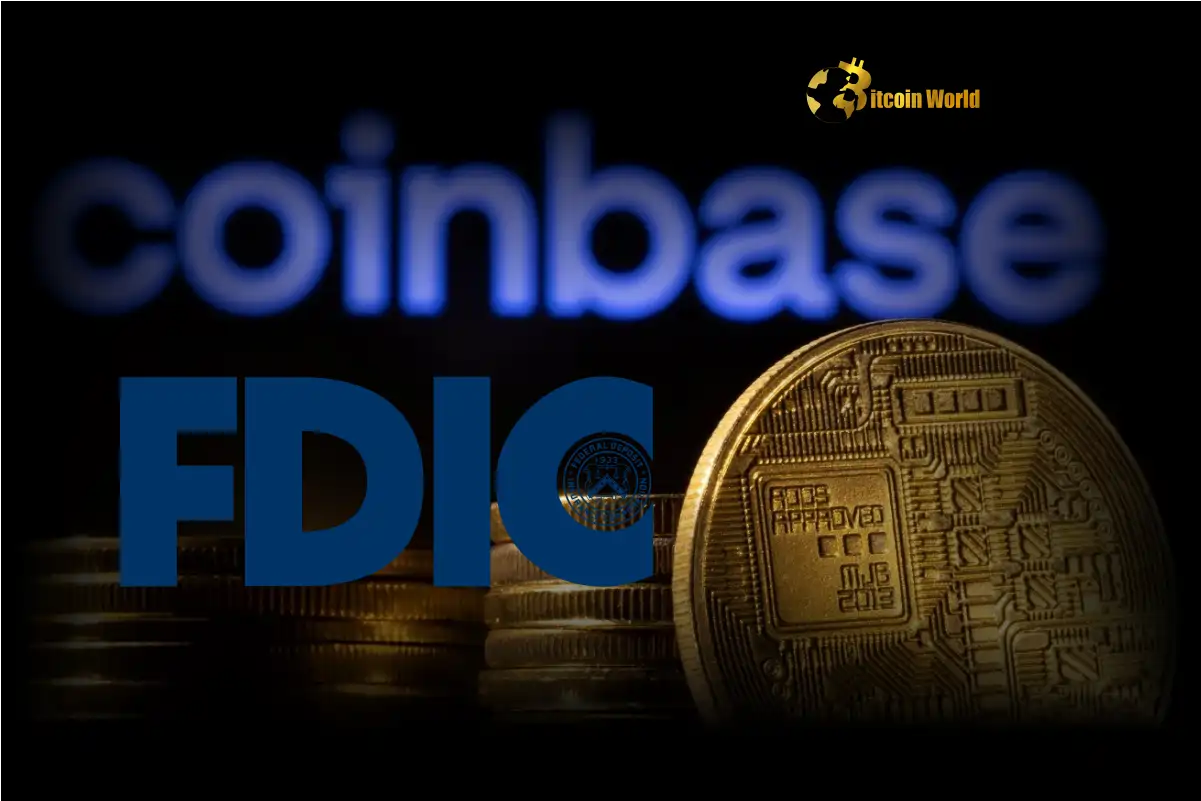Unveiling Coinbase’s Relentless Pursuit: Restarting FDIC Transparency Lawsuit
0
0

The crypto world is once again buzzing with legal drama as Coinbase, a leading cryptocurrency exchange, is doubling down on its quest for transparency. Frustrated with what it perceives as stonewalling, Coinbase has reactivated its Freedom of Information Act (FOIA) lawsuit against the Federal Deposit Insurance Corporation (FDIC). Let’s dive into why this legal battle is crucial for Coinbase, the crypto industry, and what it means for the future of crypto regulation.
Why is Coinbase Reviving the FOIA Lawsuit?
Coinbase initially filed this lawsuit to gain access to documents from the FDIC, believing these documents hold critical information relevant to the exchange’s operations and the broader regulatory landscape. The lawsuit was temporarily paused earlier this year when Travis Hill was appointed as Acting FDIC Chair, sparking hopes of a more cooperative approach. However, despite some initial improvements in communication, Coinbase feels that the FDIC is still not providing the level of FDIC Transparency required. According to a post by Eleanor Terrett, a former Fox Business reporter, on X (formerly Twitter), Coinbase alleges that key documents are still being withheld, hindering their ability to fully understand the FDIC’s stance and actions.
The Core Issue: Information Access and Regulatory Clarity
At the heart of this legal tussle is the fundamental principle of information access. Coinbase, like any regulated entity, needs clarity and access to information from regulatory bodies like the FDIC to operate effectively and compliantly. Here’s why this is so vital:
- Compliance and Risk Management: Understanding the FDIC’s internal communications and policies is crucial for Coinbase to ensure it is meeting all regulatory requirements and managing risks appropriately. Opaque regulatory processes make compliance a guessing game.
- Industry Precedent: This case sets a precedent for how regulatory bodies interact with the cryptocurrency industry. If Coinbase succeeds in compelling the FDIC to be more transparent, it could pave the way for greater openness across the board, benefiting the entire crypto sector.
- Investor Confidence: Transparency from regulators builds investor confidence. Knowing that regulatory processes are open and accountable can encourage more institutional and retail investors to participate in the crypto market.
Paul Grewal’s Stance: Insufficient Transparency Remains
Coinbase Chief Legal Officer Paul Grewal has been vocal about the need for greater transparency. While acknowledging some improved cooperation under the new FDIC leadership, Grewal stated that transparency remains “insufficient.” This suggests that while the FDIC may have made some efforts to engage with Coinbase, they haven’t gone far enough to satisfy the exchange’s concerns regarding access to vital information access.
This isn’t just about Coinbase; it’s about the broader relationship between the cryptocurrency industry and financial regulators. The demand for transparency highlights a crucial tension point: how can innovative, rapidly evolving sectors like crypto navigate regulatory landscapes that are often perceived as opaque and slow-moving?
What are the Potential Outcomes and Implications?
The court’s decision on Coinbase’s motion to resume the FOIA lawsuit will have significant ramifications:
| Outcome | Implications |
|---|---|
| Court grants Coinbase’s motion | FDIC will be compelled to respond to the lawsuit, potentially leading to the release of requested documents. This would be a win for Coinbase and potentially for transparency in crypto regulation. |
| Court denies Coinbase’s motion | Coinbase’s efforts to gain information through legal means will be thwarted, at least in the short term. This could signal continued challenges for crypto firms seeking regulatory clarity via FOIA requests. |
The Role of the Financial Watchdog: FDIC Under Scrutiny
The FDIC, as a key financial watchdog, plays a crucial role in maintaining stability and public confidence in the nation’s financial system. Its actions, or lack thereof, are closely watched by the financial industry, including the burgeoning crypto sector. This lawsuit puts the spotlight on the FDIC’s approach to transparency and its engagement with innovative financial technologies.
Is the FDIC being overly cautious, or is Coinbase asking for too much? The answer likely lies somewhere in between. Regulators must balance the need for confidentiality and operational integrity with the legitimate demands of regulated entities for clarity and FDIC Transparency.
Actionable Insights for the Crypto Community
What can the crypto community learn from this ongoing legal battle?
- Transparency is Non-Negotiable: Coinbase’s persistence underscores the importance of demanding transparency from regulatory bodies. It’s not just about individual company interests but about building a mature and trustworthy crypto ecosystem.
- Legal Avenues are Important: While dialogue and cooperation are ideal, legal avenues like FOIA can be vital tools to ensure accountability and access to information when necessary.
- Stay Informed and Engaged: Keep abreast of regulatory developments and engage in constructive dialogue with policymakers and regulators to shape a more transparent and supportive regulatory environment for crypto innovation.
Conclusion: The Fight for Transparency Continues
Coinbase’s decision to restart its FOIA lawsuit against the FDIC is a clear signal that the fight for regulatory transparency in the crypto space is far from over. This case is not just about documents and legal procedures; it’s about fostering a more open, accountable, and ultimately, healthier relationship between the cryptocurrency industry and its regulators. As the FDIC prepares its response, the crypto world watches closely, hoping this renewed legal push will finally unlock the doors to greater information access and clarity.
To learn more about the latest crypto regulation trends, explore our article on key developments shaping crypto regulation institutional adoption.
0
0
 Manage all your crypto, NFT and DeFi from one place
Manage all your crypto, NFT and DeFi from one placeSecurely connect the portfolio you’re using to start.





